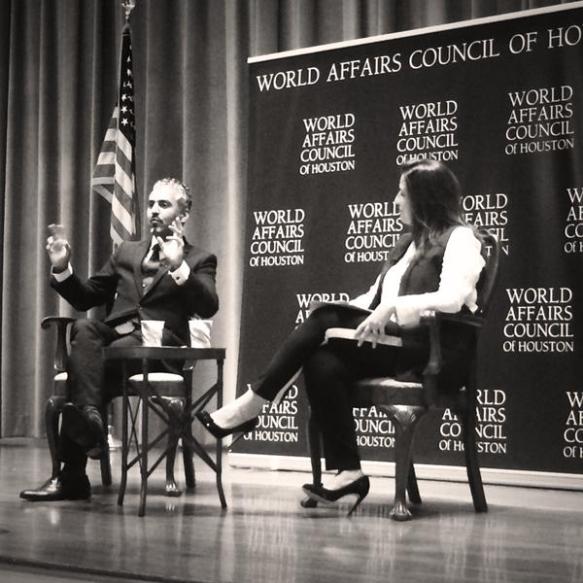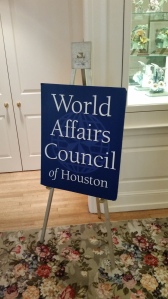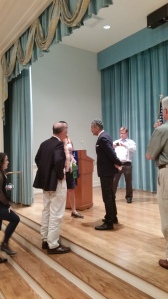Maajid Nawaz, Liberal Muslim and co-Founder of the Quilliam Foundation, gave an hour-long talk Tuesday, June the 2nd about his autobiography, Radical: My Journey out of Islamist Extremism, and how to combat ISIS’s ideology at The Junior League of Houston hosted by the World Affairs Council.
The video of the talk is below:
He addressed the crowd of about 350 about how he parted ways with the Islamist ideology and explained the strategy on how to render it unappealing in 2015. His talk lasted about 15 minutes and then went on to answer questions from Fara Killidar, Chief Executive Officer of the World Affairs Council of Houston.
“Islamism is the desire to impose any version of the religion of Islam on a society,” Nawaz said. “Jihadism is the use of force to spread Islamism.”
Starting at 16, as a member of Hizb ut-Tahrir, an Islamist organization based in London, Nawaz tried to spread the ideas and narratives of political Islam through various countries. His de-radicalization started after being arrested in Egypt and imprisoned for four years.
Having discussions with all kinds of people in prison from gay Muslims, Christian converts to Islam, Muslim converts to Christianity and even the Islamists themselves, Nawaz said he realized that his point of view wasn’t the best one. He could no longer justify to himself of the truth of the Islamist ideology. He learned that it was not the way forward, as it would lead only to more pain and suffering.
In 2008, one year after he officially resigned from Hizb ut-Tahrir, Nawaz co-founded Quilliam, a think-tank based in London that sets to challenge Islamism, in order to undue his previous past and reshape people’s future free from the Islamist ideology.
“Quilliam’s purpose is to render the Islamist ideology as unattractive, as unappealing, as Soviet Communism has become today,” Nawaz said.
In order to tackle the Islamist ideology, Nawaz said we have to understand the five key components that define a social and political movement to understand Islamism.
First, are the ideas. The ideas of ISIS and other Islamist groups come from a literal interpretation of the Qur’an and the hadith literature and use those ideas to impose their version of Sharia, or Islamic law, over all of society.
Second, Nawaz points the component of the narratives; the propaganda and the twist of facts that conform to a certain perspective. Nawaz said we see their propaganda all the time.
Thirdly, the leaders. Nawaz points out that we have the leaders of these Islamist groups imprinted in our minds. The portrait of Bin Laden, for instance, is easily recognizable. We also have a perfect picture of ISIS’s leader, Abu Bakr al-Baghdadi, preaching from a pulpit in black clothing.
The fourth component are the symbols; the identifiers of the group and the signs that signals their presence. Nawaz said that the main symbol of ISIS is their black flag, which reads in Arabic, “There is no god but God, Muhammad is the messenger of God.”
Fifth on the list is the goal. It is the main objective to the cause of the group. The goal of ISIS is to live under a Caliphate that governs by a specific interpretation of Islam, a sort of utopia. This vision of a utopia was also used in Soviet Communism as Nawaz pointed out in the talk.
Nawaz said we have to understand how a social movement works in order to deconstruct the Islamist movement and isolate it, eventually rendering it inoperable.
Nawaz then discussed one of the failings of Obama’s strategy in combating this Islamist ideology. He said that Obama is not identifying the threat, and as a result, is confusing and muddying the discussion about the problem of jihadism. Obama has been avoiding any mention of ISIS being Islamic and pro-actively calls them not Islamic. Obama has been saying ‘the terrorist threat’ or ‘the violent ideology of extremism’ which, Nawaz said, is too vague to isolate and speak honestly about the problem.
Nawaz coins Obama’s strategy to avoid calling ISIS Islamic or Muslim as the ‘Voldemort Effect’. Just like in the Harry Potter series, people cannot name the evil villain, Voldemort, out of fear. They must say, ‘he who must not be named’.
He said that their are two ways in which it hurts the discussion. First, by denying Muslims the opportunity to fight against Islamism.
“It dis-empowers those liberal Muslim voices who wish to retain their Muslim identity from challenging this extremism and isolate it by naming it,” Nawaz said. “It denies them a lexicon through which they can express their grievances.”
Secondly, it increases the fear from non-Muslims about the religion itself and Muslims as a whole. He said that the average Joe would see or read Obama’s speech and conclude that this ‘violent extremist ideology’ is Islam itself and therefore see all Muslims as the same and as the problem.
“We increase the fear, we increase the hysteria,” Nawaz said.
In a question about how radicalization happens, Nawaz said that it does not happen in a vacuum and that the internet is not the real culprit.
“This has happened because decades upon decades in the United Kingdom, across Europe and actually, across the world, the Islamist ideology has had its propaganda unchecked on the grass roots to the point now where the default form of expression for many young British Muslims is the Caliphate,” Nawaz said.
Nawaz mentioned the recent attack in Garland, Texas by two men trying to kill people attending a draw Muhammad cartoon contest.
“Bigots have a right to be bigots without being shot at,” Nawaz said. “You’ve got your right to have your views about my prophet and I have to take that because this is the consequence of having a free society.”
He also noted that far-right Christian extremism has a symbiotic relationship with Islamism. One way they feed off each other, Nawaz said, is that Islamists will say that all non-Muslims want to kill Muslims and Christian extremists will then use that as a vindication to fear and fight back against all Muslims.
“So they need each other as proof that they are correct about the other,” Nawaz said.
“What we really should focus on is in what we have in common: our Democratic culture, classically liberal values, respect for individual rights and autonomy and see how those can bring us together,” Nawaz said.
He is corroborating with author, neuroscientist, and critic of religion Sam Harris, in a new book about the future of Islam titled, Islam and the Future of Tolerance: A Dialogue. The release date is October 6, 2015.


